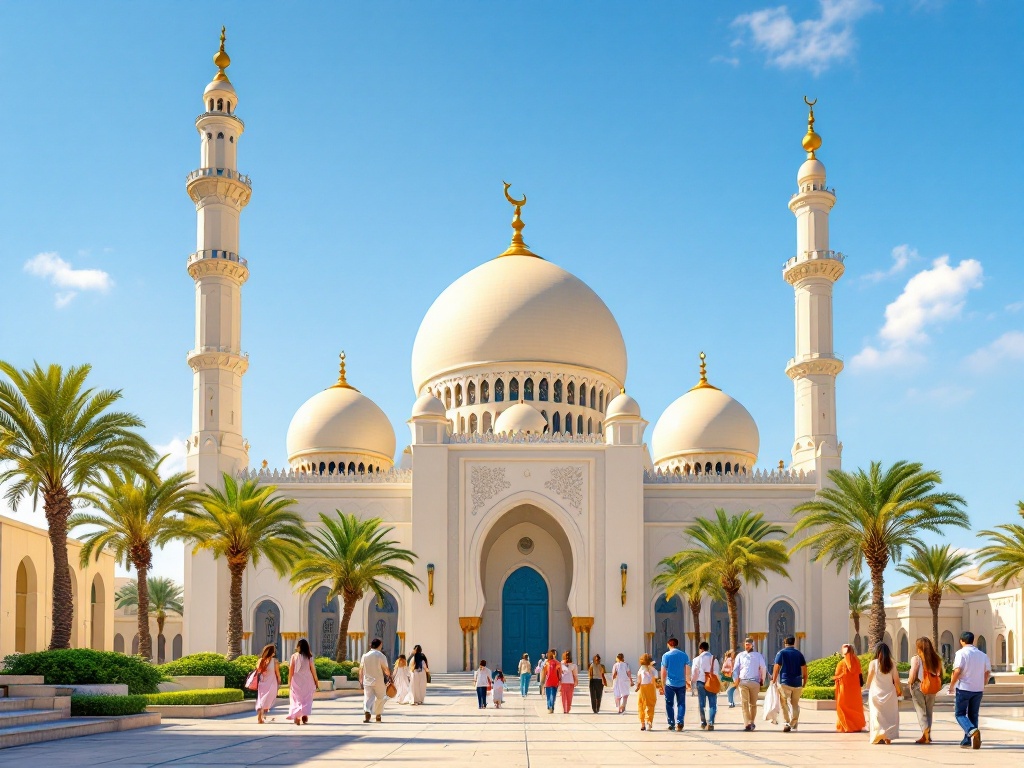Things to Consider Before Traveling to Bahrain
Discover Bahrain, an island nation blending ancient history with modern marvels. Explore the Bahrain National Museum and the Al Fateh Grand Mosque. Plan your trip with essential tips on visa requirements (valid passport needed!), health precautions, and staying safe. Learn about local customs, the best time to visit (October to April offers ideal weather), and how to navigate the transportation system. Start your Bahraini adventure today!
Important information

- Passports must be valid for at least six months beyond your planned stay.
- Visa requirements vary by nationality; check before traveling. Some nationalities can get visas upon arrival, while others need to apply beforehand.
- The best time to visit Bahrain is during the cooler months, from October to May, for comfortable sightseeing.
- Dress modestly, especially in public and religious sites. Women should cover their shoulders and knees, and men should avoid shorts.
- Carry your passport or a copy at all times, as it’s required by law.
Introduction to Bahrain
Discover Bahrain, an island nation in the Persian Gulf, nestled between Saudi Arabia and Qatar. This captivating destination seamlessly blends ancient wonders with modern marvels. Explore historical sites like the Bahrain National Museum, the ancient Qal’at al-Bahrain, and the magnificent Al Fateh Grand Mosque. Beyond its rich history, Bahrain boasts striking architecture, bustling shopping districts, and a diverse culinary scene. For travelers planning to enter Malaysia, it’s important to note that Bahrain is not a requirement for entry. However, if you’re interested in visiting Bahrain, you can find visa information at eVisa Bahrain.
Plan Your Trip to Bahrain
Before embarking on your Bahraini adventure, consider these essential tips:
- Passport Validity: ensure your passport is valid for at least six months beyond your intended stay.
- Visa Requirements: check the specific visa requirements for your nationality, as some nationalities can obtain visas upon arrival while others require advance applications.
- Health Precautions: consult your doctor about recommended vaccinations and health precautions.
- Travel Insurance: consider obtaining travel insurance for unforeseen circumstances.
Important Reminders for Your Stay
Given Bahrain’s warm climate, remember the following:
- Hydration: stay hydrated by drinking plenty of water throughout the day.
- Sun Protection: protect yourself from the sun by using sunscreen, wearing protective clothing, and seeking shade during peak hours.
Visa Requirements for Bahrain
Visa requirements for Bahrain vary based on your nationality. Some nationalities can enter visa-free for a designated period, while others can get a visa upon arrival. However, some nationalities need to apply for a visa in advance. Your passport must be valid for at least six months beyond your planned arrival date. For example, if you arrive on January 1st, your passport’s validity should extend to at least July 1st. Always verify the latest entry rules by contacting the nearest Bahraini embassy or consulate, or by checking official government travel websites for the most current information.
Types of Visas Available
Bahrain offers several visa options for visitors. A tourist visa is suitable for leisure trips, while a business visa is designed for work-related purposes. Transit visas are available for travelers passing through Bahrain. For information on other visa categories, requirements, and applications, contact the nearest Bahraini embassy or consulate.
Passport Validity and Entry Requirements
For your trip to Bahrain, ensure your passport remains valid for six months after your return.
You will need a visa, but the specific requirements depend on your citizenship.
While in Bahrain, always keep a photo ID with you, as it’s legally required.
Visa Extension Options
To extend your Bahraini visa, contact the Nationality, Passports, and Residence Affairs (NPRA) for details on the process and required documents. This information is crucial for a successful extension.
Travel Safety and Advisory in Bahrain
Traveling to Bahrain requires increased caution due to safety and security concerns. Be mindful of petty theft, particularly in crowded areas. Stay aware of your surroundings and keep up with local news for any potential safety updates. A valid passport and visa are required for entry to Bahrain. Visa requirements vary depending on your nationality. Some nationalities can obtain a visa upon arrival, while others need to apply in advance. Consult the specific visa requirements for your country before traveling. Before your trip, consult your doctor about recommended vaccinations and consider purchasing travel insurance for unforeseen circumstances. Remember to stay hydrated and use sun protection, especially during hot weather, to avoid health issues. Respect local laws and customs during your stay in Bahrain.
Safety Precautions for Travelers
Planning a trip to Bahrain? Prioritize your health and safety with these essential tips:
Health
- Consult your doctor about recommended vaccinations, such as Hepatitis A, B, and Typhoid.
- Pack all necessary medications and a basic first-aid kit.
- Stay hydrated and be cautious about consuming food and drinks to avoid any health issues.
Safety
- Stay informed about local news and avoid any areas of potential unrest.
- Consider travel insurance that covers medical emergencies.
Legal Requirements: Identification and Local Laws
In Bahrain, always carry your passport or a clear copy, as it’s required by law.
Be mindful of local laws regarding public behavior, including restrictions on public displays of affection. Respect Bahraini customs and traditions.
Health and Medical Insurance Requirements
Planning a trip to Bahrain? Consider travel medical insurance for peace of mind. Protect yourself from unexpected medical costs and enjoy your travels worry-free.
Cultural Norms and Etiquette
Rooted in Islam, Bahrain’s culture emphasizes modesty, especially in public. Women should dress to cover their shoulders and knees. Men are advised to avoid shorts. Public displays of affection are generally frowned upon. During Ramadan, refrain from eating, drinking, or smoking in public during daylight hours. Above all, politeness and respect for local customs will greatly enhance your trip.
While Western clothing is becoming more common, traditional attire like hijabs for women and thobes for men reflects the country’s Islamic heritage. Though not mandatory for tourists, understanding these customs, including modest dress at religious sites, ensures a respectful visit. Consulting travel guides for further guidance on appropriate attire is always recommended. Courtesy remains a key ingredient for a positive experience in Bahrain.
Local Customs and Laws
Public displays of affection are discouraged, so please be mindful of local customs. Also, remember to respect religious customs.
Alcohol consumption is permitted in licensed establishments, but not in public areas. Drug possession carries severe penalties, including imprisonment. Gambling is also prohibited by law.
Dressing Modestly in Public
In Bahrain, modest attire is important, particularly in public spaces. For women, this means covering their shoulders and knees. Men should generally avoid shorts. This respectful approach honors local customs and traditions, many of which are rooted in Islam. Modesty is especially vital when visiting religious sites. For example, women might need to cover their hair and wear loose-fitting clothing. Men may also be asked to wear long pants. Remember, dressing respectfully demonstrates cultural sensitivity and enhances your travel experience.
Climate and Weather Conditions
Bahrain experiences a desert climate characterized by intensely hot summers and mild winters. From June to September, temperatures soar to an average of 90°F to 104°F (32°C to 40°C), coupled with high humidity. The winter months, from December to March, offer a pleasant contrast, with temperatures ranging from 50°F to 68°F (10°C to 20°C). Rainfall is minimal and mainly occurs during winter. Sandstorms are a recurring weather event throughout the year, particularly in summer. Humidity levels remain high year-round, often exceeding 80%.
Best Time to Visit Bahrain
Bahrain offers the most pleasant weather from October to April, with temperatures ranging from a comfortable 65°F to 85°F (18°C to 29°C). This period is perfect for enjoying various outdoor activities.
For optimal sightseeing, visit between November and March. The shoulder seasons of October and April also offer pleasant temperatures with fewer crowds.
Summer (June to September) brings intense heat, often exceeding 100°F (38°C), making outdoor exploration challenging. If you plan a summer trip, be prepared for extreme heat and humidity.
The cooler months are ideal for exploring Bahrain’s historical sites like the Qal’at al-Bahrain fort and the Al Fateh Grand Mosque. These comfortable temperatures allow for more enjoyable outdoor activities compared to the restrictive summer heat.
Seasonal Considerations
Bahrain experiences extreme temperatures during the summer months, from June to September, often exceeding 104°F (40°C). However, spring and autumn offer milder weather perfect for outdoor activities. The ideal time to visit for pleasant temperatures is between March and May or from October to November. Winters, from December to February, are mild with average temperatures around 68°F (20°C). Rainfall is minimal year-round. When planning your trip to Bahrain, consider these temperature variations to choose the best time for your preferred activities, whether it’s exploring the desert or enjoying watersports.
Summer (June-September)
Temperatures regularly surpass 104°F (40°C).
Spring/Autumn (March-May & October-November)
Ideal weather for outdoor activities. Considered the best time to visit.
Winter (December-February)
Mild temperatures averaging 68°F (20°C).
Rainfall
Minimal throughout the year.
Weather and Climate Impact on Travel
Bahrain’s climate plays a crucial role in travel planning. Summers (June-September) are extremely hot and humid, making outdoor activities challenging. The milder weather from October to May is ideal for sightseeing and exploring outdoor attractions. Rainfall is minimal, primarily during winter. For the best experience, plan your trip between October and May.
Transportation and Getting Around
Bahrain offers convenient public transportation, with buses serving major cities and towns, and taxis readily available for shorter trips. The country has a well-maintained road network, encompassing both highways and city streets. Driving is on the right-hand side, traffic laws are strictly enforced, and international driving permits are recognized.
Public Transportation Systems
Bahrain offers a dependable public transportation network. The extensive bus routes, operated by the Bahrain Public Transport Company, simplify island travel. Taxis are another readily available and convenient choice.
Road Conditions and Traffic Laws
Driving in Bahrain: Essential Information
Rules and Regulations
- Drive on the right side of the road.
- Seat belts are mandatory for all passengers.
- Mobile phone use is permitted only with a hands-free device.
- Drinking and driving is strictly prohibited and carries severe penalties.
Speed Limits and Road Conditions
- Urban areas: 60 km/h (37 mph).
- Highways: 100 km/h (62 mph).
- Road signs are displayed in both Arabic and English.
- Roundabouts are common.
- Driving habits and road conditions can be unpredictable, exercise caution.
Be prepared for frequent police checkpoints and always yield to pedestrians. Traffic violations result in fines.
















